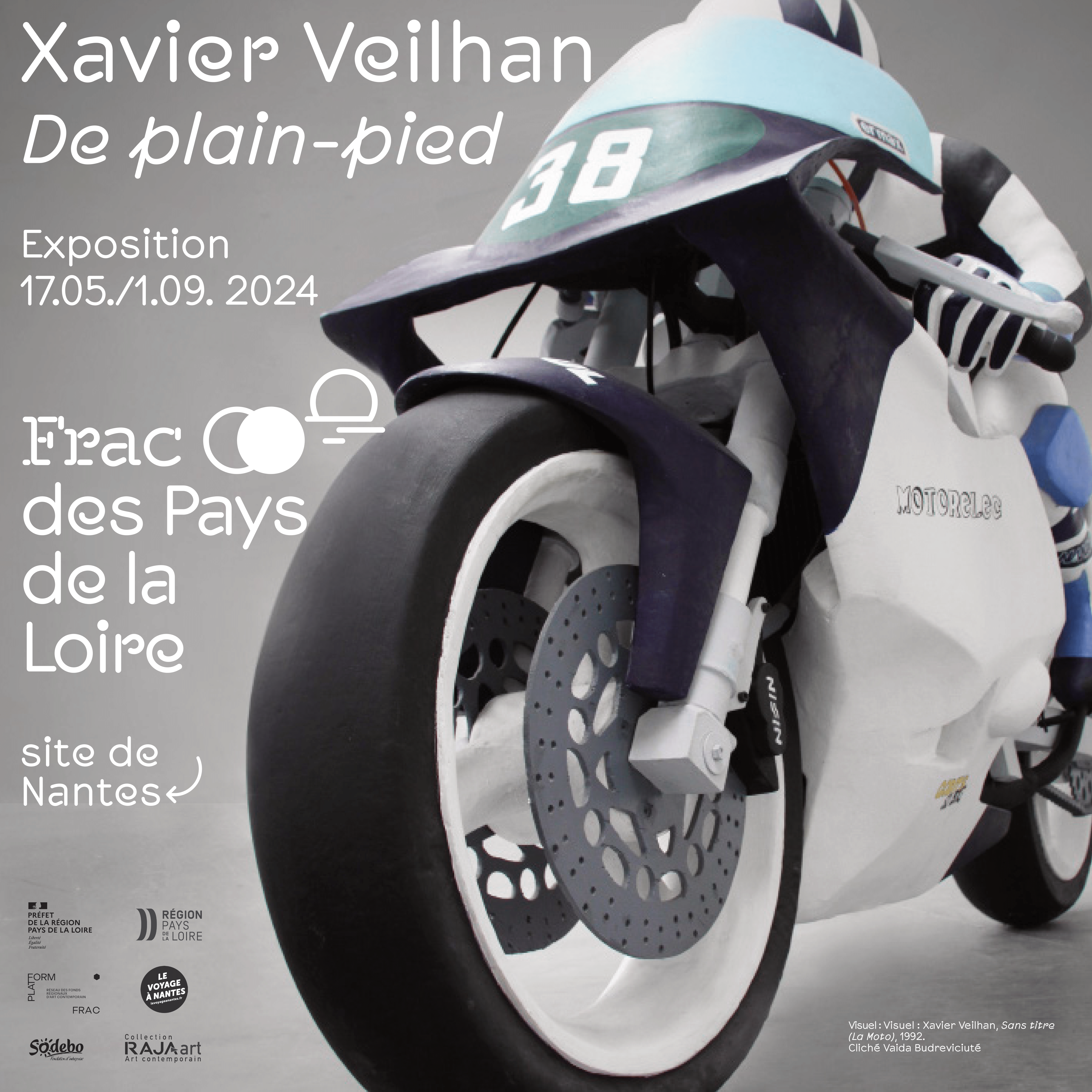Ariane Loze
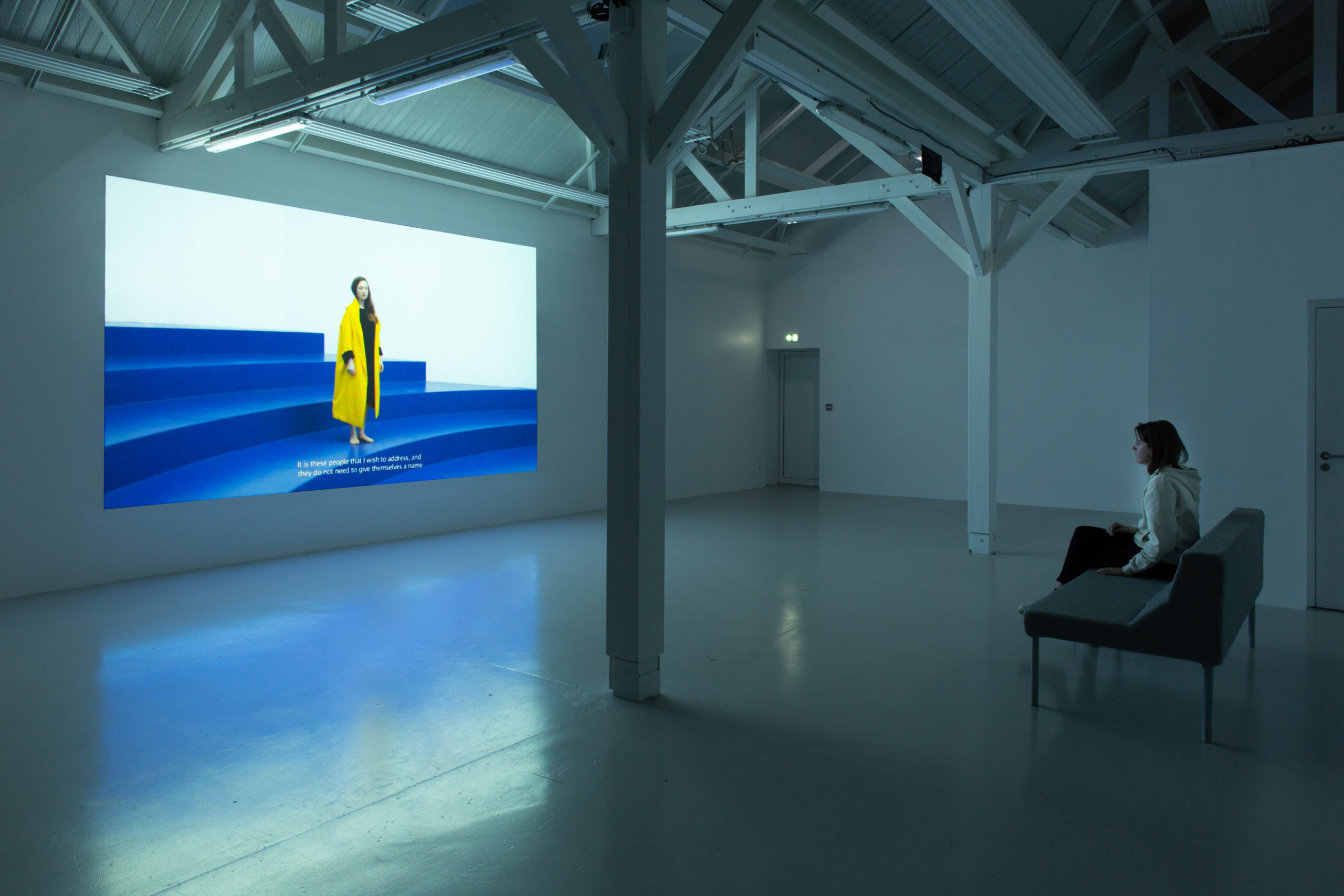
Utopía
40mcube, Contemporary Art Centre, Rennes, 12.02.2021 – 07.05.2021
With the commendable purpose of giving full access to the works, both aesthetically and in terms of content, Ariane Loze’s exhibition at 40mcube was intended to be parsimonious and was radically reduced to a selection of two videos from 2018. Shown successively on two large screens in the same location, they offer visitors all the space and time they need to watch them in their entirety and attentively, several times if they feel like it, to soak them in, to remember them, and, in between screenings, through an effect of persistence that is as much retinal as intellectual, to create a third imaginary film for themselves.
The longer of the two videos, Mainstream, was made during an exhibition at the Chanot contemporary art centre in Clamart, where it was presented more exactly in the triple form of a set, a performance, and a film. A table, richly laid with the most sumptuous tableware, was set up for filming and was then part of the exhibition space itself. In addition, part of the filming was done again in front of the public, allowing the audience to discover how the artist played all the characters in her films, while at the same time taking care of framing and adjusting the parameters of the camera… which is almost a form of artwork in itself. And then there was this film, shot just before the opening of the exhibition, which features female characters that appear to be quite socially high placed and who share their experiences and opinions on the contemporary world, in the muffled atmosphere of a presumably opulent interior. Thus, these different components of the film, -that are quite revelatory of the nature of Ariane Loze’s work-, bring her rather closer to artists with a Fine Arts background who end up in cinema and create bridges between these two fields.1
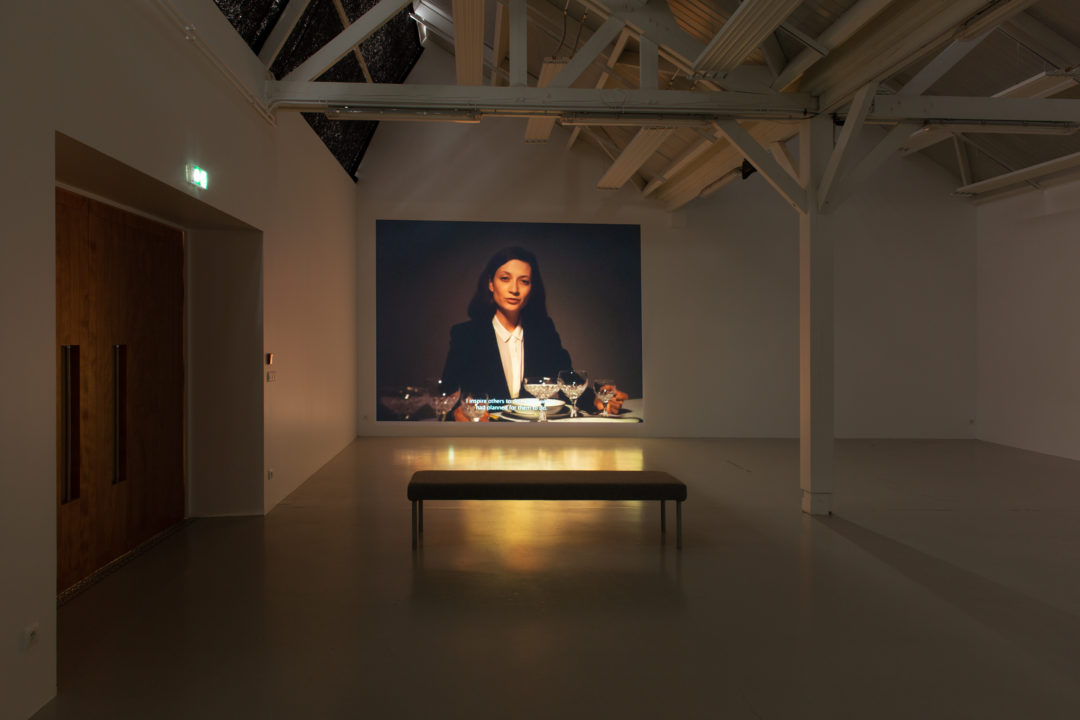
However, the other film exhibited reveals another aspect of the artist’s work that is usually less noticed: the importance of the topic of politics.
The second video and its title, which also gave the exhibition title, immediately leads us in the direction of a corpus of texts, reflections and radical projects, going from Thomas Moore to William Morris, and through Etienne Cabet. Utopia is essentially made of a discourse with a programmatic rhetoric and sprinkled with dialogues regarding the need to reconstruct society. As per usual, Ariane Loze plays all the characters, -and in this case two-, who are clearly distinguishable and different, even though she wears the same large bright yellow coat for both of them. The coat contrasts with the azure blue of the set, which recalls a celestial space, a type of “nowhere”, or a futuristic assembly hall. In reality, it was actually the Belgian Pavilion at the 16th Venice Architecture Biennale, which was organised in circular bleachers, and which referenced the idea of the construction of a cultural Europe that has barely been sketched out and has never really been achieved.2 The blue and yellow colours of the video may also remind us of those of the European flag. Everything thus contributes to convey a solemn situation, that of an official meeting or a political assembly, where thought is built through a plurality of voices. Finally the text, which ends with the words “let us create blue circles, circles of attention”, convinces us that it is, in its own way, a call to build a new common political future.
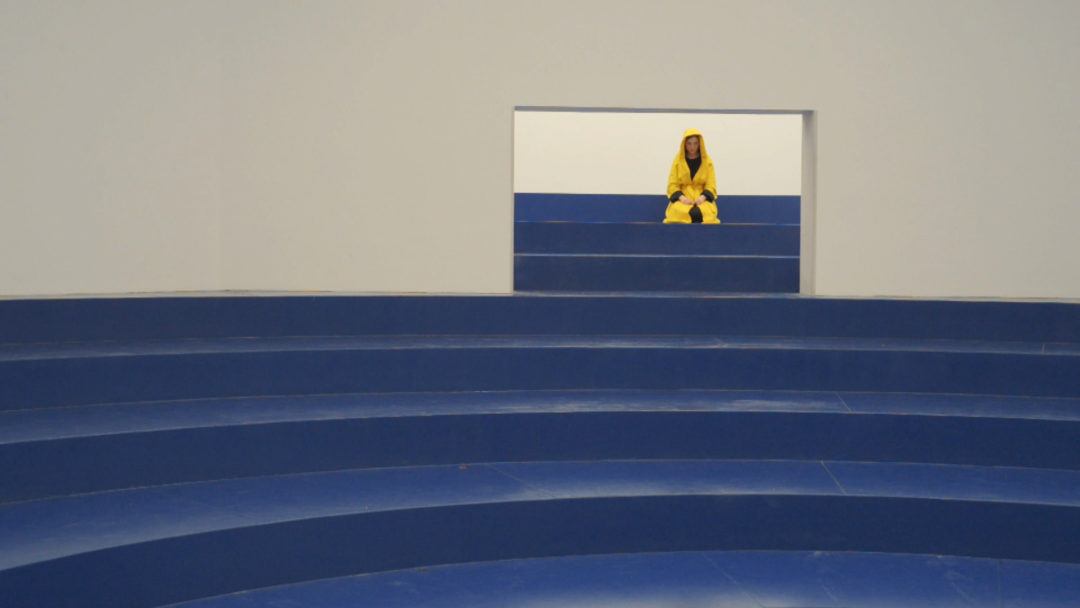
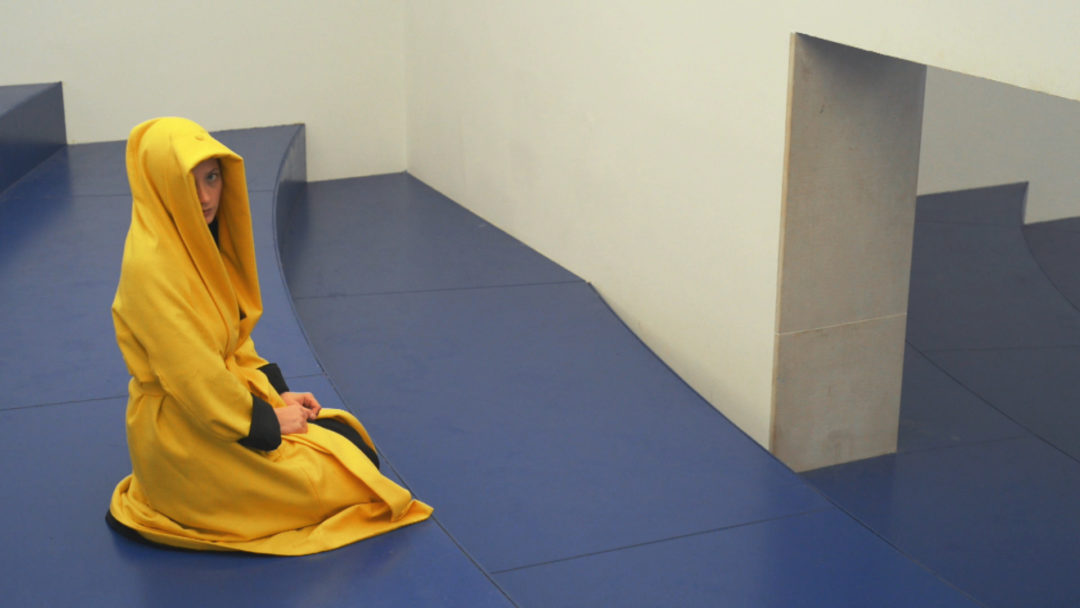
In contrast, the discussions of the first video are to be understood differently. The words of the characters seated at the table sound like the opposite of Utopia’s dream society. Using a managerial type of language inspired by real interviews published in business papers, those words express the point of view of neo-liberalism through the telling of anecdotes. We hear of the manoeuvres and decisions of the top leaders and executives, in a no less cynical female version, as they share their profits and aim at continuing to do so.
The confrontation between the two videos of the exhibition makes the political issue a key entry point in Ariane Loze’s work, -or at least in her recent practice-, and encourages us to look back at her other artworks to see when and how it has already manifested itself.
At about the same time that she made Mainstream and Utopia, the artist conceived of Inner Landscape for the first Riga Biennial; a film that seemed at first sight rather different, shot outside and tracing the ascent of a hill at the countryside. However, one can quickly come to understand that the subject matter is the same as in Utopia; that of the ground zero for a new society. Two Ariane Lozes are in dialogue: one leads the other on a double walk through the fields and trough the thought process for new politics, metaphor for the confrontation of outer and inner landscapes as made obvious by the announcement: “we are in the right place, it’s called the beginning.” The entire discussion that follows consists of a dialogue regarding the desire to start over, counterbalanced by the fears that revolutionary projects may create. The interweaving of the two arguments in the artist’s duplicated mouth, edited in reverse-angle, suggests that the multiplicity of opinions is also an inner multiplicity: the dialogue with others is as much a dialogue with oneself.
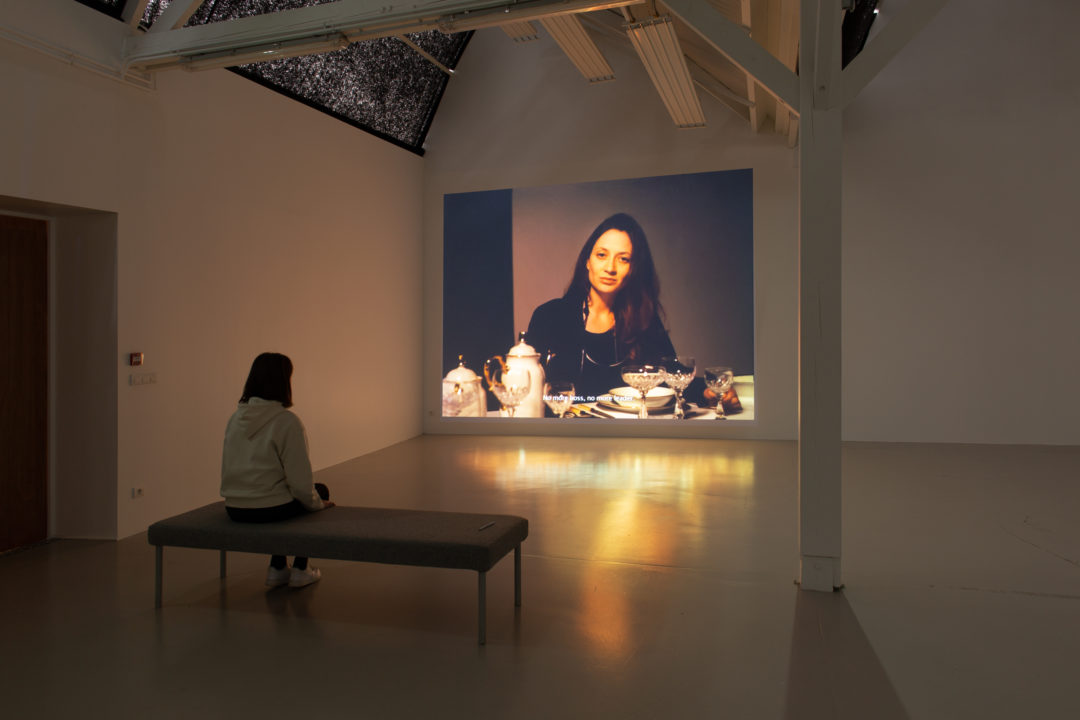
In a fourth video from 2018, Studies and Definitions, the political element is very explicit. We witness a debate that arose from the reading of the first page of the consolidated version of the Treaty on European Union, all of which was conceived by the artist in order to confront existing texts. But this very specific concern had already motivated the production of a previous video that marked a turning point in her work: Impotence, in 2017. Conceived at the time of the presidential elections’ debates in France, the video consists of purely political thoughts on the need to participate and engage or, on the contrary, to lead one’s own life in the indifference of communal life. Identically dressed and coiffed, two characters talk together and recall once again a plurality of people as well as an inner plurality, sometimes animated by contradictions. One can remember here the analogy made between the political and the soul that already structured Plato’s Republic. But in the case of Ariane Loze’s work, this complex relationship between the multiple and the self, and vice versa, forces us to take a closer look at a word that often appears in her texts and titles. A word that may seem unimportant, but which, when thinking about politics, becomes significant: the pronoun “we.”3 For if, in her first videos, Ariane Loze was playing all the parts for simple practical and economic reasons, this multiplication of the “I”, as it evolves, lead to a “we” taken as the starting point for the announcement of a project of society. The “we” is for example eminently present in the title of her exhibition at the Chanot contemporary art centre, “We are not, we are becoming”, and then recurrent in her films’ speeches. “We have found a place where to meet,” states the beginning of Utopia, “we represent millions of citizens… with the same voice, with the same body…” The question then is whether the “we”s are to be understood as exclusive or inclusive, whether the visual form that serves as a framework for the words that offers distance and reduces them to metaphors, or whether they are real messages that can be received by us in all seriousness, through art.
- One can even add that she is also currently working on an adaptation of Mainstream for the theatre, thus pushing her towards another medium too.
- Detail brought up by Ariane Loze to the author, during a phone call on March 24, 2021.
- Regarding the complicated issue of the « we » in politics, one can refer themselves to the Fourth conference of Martin Rueff on his pronoun philosophy, on April, 8, 2015 at the Bibliothèque Nationale de France: https://www.bnf.fr/fr/mediatheque/nous.
Image on top : Ariane Loze,Utopia, 2018, projection HD avec son, couleur / HD projection with sound, color, 10’27 », édition de 5 exemplaires / 5 copies+ 2 AP. Courtesy de l’artiste et / the artist and Michel Rein, Paris/Bruxelles. Vue de l’exposition / Exhibition view « Utopia », 2020, 40mcube, centre d’art contemporain, Rennes
- From the issue: 96
- Share: ,
- By the same author: Alias at M Museum, Leuven, Jérôme Zonder at Casino Luxembourg, Nathaniel Mellors, ELNINO76, Yannick Ganseman*,
Related articles
Playground
by Patrice Joly
GESTE Paris
by Gabriela Anco
On the High Line
by Warren Neidich

